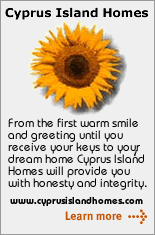The British resident's society
Established in 1975 the British Residents Society was formed for British nationals that have decided to make Northern Cyprus their new home. The society's office known locally as "the hut" is open every Saturday between 10.00am and 12.00pm . The hut is situated behind the Post office in Girne.
A member of the society can also be found most Fridays at Pegasus restaurant in Karao glanoglu between 11.00am and 1.00pm .
The society aims to provide assistance to British nationals and have direct access to the British High Commision in Lefkosa and also to various government departments.
The society is a non profit making organisation and membership is available to all holders of a valid british passport. Membership is renewed annualy.
The British consul is available at the hut on the first Saturday of every other month between 11.00am and 12.00 noon.
BRITISH RESIDENTS SOCIETY.
PO BOX 167, GIRNE, MERSIN 10,TURKEY.
INFORMATION & SERVICE FACILITIES |
The Society was established in 1975 for British nationals who had come to live as permanent residents in Northern Cyprus (now the TRNC) many of whom were proud of their title ‘Ancient Brits’. There are still quite a number of these around, but also there are younger ‘Modern Brits’ now finding that the slow pace and safe atmosphere makes for a very attractive place in which to live.
The BRS Handbook tries, in some measure, to point all would-be and residents in the right direction and to answer a few of the questions that naturally arise when one is living abroad. However, it must be stressed that specific problems can more easily be dealt with by direct contact and callers are welcome at the office (known locally as the ‘Hut’) situated behind the Post Office in Girne (Kyrenia). We are open every Saturday morning between 10.00am and 12.00 noon, where a member of the Committee is available to assist. A Committee member is also at Pegasos Restaurant, Karaoğlanoğlu most Fridays from 11 a.m. to 1 p.m. We also provide a variety of information sheets.
The Society is strictly non-partisan and non-profit making and full membership is open to all holders of a valid British Passport, who own/rent property and use it regularly or as a holiday/second home, once their application has been approved by the Committee. Associate Membership is available to persons of other nationality who are married to full members. There is an annual subscription due on the first of January each year, currently ₤10.00 for Full Members and ₤9.00 for Associate Members. In April 2005 membership stood at 667.
The objects of the Society are to foster friendly relations with the people of Cyprus, to advise and assist members and to make representation on their behalf to the authorities.
The Society has direct access to the British High Commission and to Government Departments of the TRNC and enjoys their support.
Information in the BRS Handbook
Background of The British Residents’ Society
The British High Commission
UK Tax, Immigration Control
Residence Permits, Business and Work Permits
Property – purchase, renting etc
Transportation of Personal Effects to/from the UK
Private Transport and Import of Cars, Car Rental, Driving Licence
Making a Will, The Army and Military Service Law
Local Administration
Medical, Dental & Opticians
Importing Pets
Places of Historical/Archaeological Interest
Temperature and Clothing, Local Time, Currency
Weights and Measures, Shopping
Working Hours, Banking, KDV or VAT
Public and Religious Holidays
Gardens, Water, Electricity, Refuse Collection
Petrol Stations, Road Transport, Ferry Boats
Air Transport
Postal and Telecommunications Service
Television and Radio
Clubs, Associations, Library and Charitable Organisations
Sport, Pubs, Restaurants and Casinos
Education in the TRNC
Churches, Births, Marriages and Deaths
Useful Telephone Numbers
|
|
An Introduction to Northern Cyprus by Prof Clement Dodd
Northern Cyprus has a population of some 200,000, rather less than a quarter of the population of the island. Apart from occasional workers, permanent immigrants from Turkey since 1974 number some 50,000; they have been, and are continuing to be, assimilated into the community.
There are close connections between Turkish Cypriots and the now large Turkish Cypriot community in Britain. British visitors and residents are always welcome in Northern Cyprus, and English is widely spoken.
Northern Cyprus gained its independence in 1974. In that year Turkey intervened militarily – to deliver the Turkish Cypriots out of the hands of the Greek Cypriots who, in 1963, had forced the Turkish Cypriots out of the partnership government established by international treaties in 1960 according independence to Cyprus. After 1963 many Turkish Cypriots lived perforce in self-defended enclaves to preserve their liberty. In 1974 a Greek army-led coup promised to deliver the longed-for union with Greece (enosis). Turkey intervened as a Guarantor Power under the 1960 Treaty to prevent enosis and to restore the rights of the Turkish Cypriots. As a result of military operations, some 150,000 Greek Cypriots fled to the South and 50,000 Turkish Cypriots to the North. The Turkish Cypriot state was then established in what was about a third of the island.
Negotiations for the establishment of a new federal state on the island have been going on since 1977 under UN auspices, but without result. This is mainly because the Greek Cypriots believe they should have the major say in government, whereas the Turkish Cypriots believe that they should have an equal voice.
The most recent attempt (the UN’s Annan Plan) to unite the two sides in a federal government failed. In simultaneous referenda nearly 75 per cent of the Greek Cypriots rejected the Annan Plan, whilst 66 per cent of the Turkish Cypriots approved it. On 1 May 2004 the whole of Cyprus became, in theory, part of the EU, but in practice this does not apply to the TRNC, which continues to assert its independence. However, EU passport holders may now cross the border freely in either direction.
Northern Cyprus is a parliamentary democracy, with an elected President with limited powers. There are two major political parties, one nationalist and right-wing, the other left-wing. They have been equally balanced in parliament since the December 2003 parliamentary elections.
Owing mainly to international embargoes on trade, and prohibition of international air flights, the Turkish Cypriot economy is relatively underdeveloped. Nevertheless, in the last few years there has been a surprising spurt. This is partly reflected in the present building boom, though this also relates to the recent considerable growth in the expatriate population.
On boost to the economy has been the growth of universities, now five in number, all using English as the language of instruction. There are a total of 25-30,000 students, who are mainly from Turkey. Despite the greater rate of economic development, the TRNC is still largely dependent on Turkish economic and military assistance. However, there is a possibility that the embargoes will be lifted.
North Cyprus continues to be a relatively quiet, unspoiled and relaxed country where British and other foreign residents find much to their liking.
2004
|
|
|
Contact Us 
You can contact
us with any question about Properties
for sale in North Cyprus or related
services. You can contact us directly
by phone, fax or email.
info@cyprusislandhomes.com
|
   
|